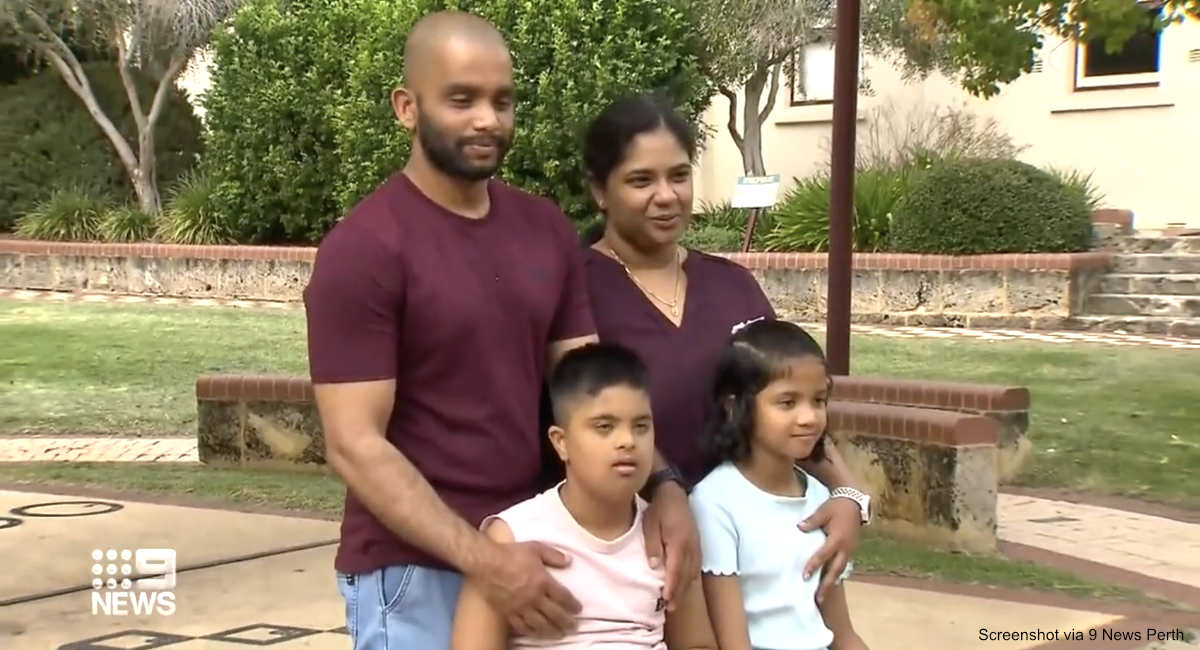An Indian family living in Australia recently faced deportation because their son has Down syndrome and was deemed to be a “burden” on the Australian government’s healthcare system.
It was only after a considerable outcry and media attention that Immigration Minister Andrew Giles intervened and allowed the family permanent residency.
ABC News reports that Aneesh Kollikkara and Krishna Aneesh immigrated to the country in 2016 with their children. The couple recently applied for permanent residency but were told that their 10-year-old son, Aaryan, failed the permanent visa test because it was perceived that his potential healthcare costs would be too much in the state-funded system. In its calculations, the government determined that looking after Aaryan would cost $664,000 over 10 years. However, the family argued that they didn’t plan to utilize any special services, as Aaryan is high-functioning and attends a mainstream private school.
Without the visa, the family was told they would have to leave the country by March 15. They exhausted all means of appealing the decision before their last resort, which was a plea to Giles to reverse the visa rejection.
On the morning of March 8, Aneesh said she heard from Giles, who told her that he had intervened and that the family could stay.
“I was really happy, I was over the moon. It was such great news I’ve ever heard, after my kids’ birth,” she said. “When I received the email I literally burst into tears. We can stay here, we can live in this community, we can provide a very good environment for our kids.”
The Aneesh family’s case highlights just one of the many challenges that families face when they deal with government-run healthcare. The marginalized run the risk of being overlooked or turned away in favor of profit when governments have to determine whether or not someone is eligible or worthy of treatment.
Dr. Jan Gothard is a migration specialist who spoke with ABC News about the difficulties she sees migrant families face.
“I’m very happy that the minister has intervened in this case, it’s been a very long, hard road for them … it’s disappointing that they have to go through this path, but at last, decency has prevailed,” Dr. Gothard said. “But it’s just the tip of the iceberg, because there are so many cases where people aren’t eligible to apply for ministerial intervention, for a whole host of reasons — they might be offshore, they might not fit the category.”
Australian Christian Lobby Acting Director Dan Flynn also decried the role of the government in determining whether or not someone is a “burden.”
“What the government is doing is they are sending a message that if you have if a child that has Down syndrome, they’re a burden. And I think it’s a message that goes beyond the immigration issue to the life issue. It’s sending a message to everyone and to young pregnant mothers, that if their child has Down syndrome, that child really ought to be aborted because they’re a burden on society,” he told Vision Radio. “These children are not burdens. They bring a lot of joy and happiness. And this particular child is a beautiful child as they appear to be seen online,” he added. “To deport a family because they have a child with Down syndrome is basic discrimination on the basis of disability. Nothing short of it.”
The Aneesh family is not the first family to face deportation due to a health issue, and sadly, not everyone has had such a positive outcome. As Live Action News previously reported, the Lund family had a visa rejection overturned after they faced deportation in 2020 due to their son’s Down syndrome, while the Hyde family was forced to leave the country in 2019 due to their child’s cystic fibrosis.








